

CongoRainforest latest. U.S. Global Health Initiative: Democratic Republic of the Congo. DRCStrategy. Vital sites. a0789e. Democratic Republic of Congo Talks Climate: The public understanding of climate change. The Democratic Republic of Congo. Author and Page information Described by some as Africa’s first World War, the conflict in the DRC (formerly known as Zaire) has involved seven nations.
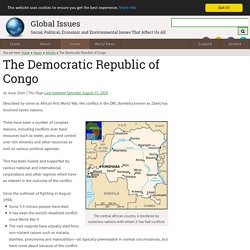
There have been a number of complex reasons, including conflicts over basic resources such as water, access and control over rich minerals and other resources as well as various political agendas. This has been fueled and supported by various national and international corporations and other regimes which have an interest in the outcome of the conflict. Since the outbreak of fighting in August 1998, These shocking figures would usually be more than enough to get media attention the world over, especially if it were to threaten influential nations in some way. On this page: Brief Background. Climate change linked to spread of disease. Climate change is emerging as a major threat to health and adding pressure on public health systems, especially in Africa, a senior UN official has said.
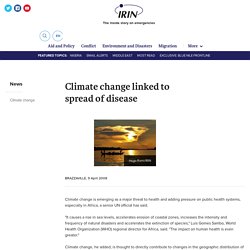
"It causes a rise in sea levels, accelerates erosion of coastal zones, increases the intensity and frequency of natural disasters and accelerates the extinction of species," Luis Gomes Sambo, World Health Organization (WHO) regional director for Africa, said. "The impact on human health is even greater. " Climate change, he added, is thought to directly contribute to changes in the geographic distribution of vector-borne diseases such as malaria and epidemics of meningococcal meningitis, Rift Valley fever and cholera in previously unaffected areas.
"For example, the geographic distribution of meningococcal meningitis appears to be expanding from the usual meningitis belt to the southern African region," Sambo said on 7 April during the commemoration of World Health Day in Brazzaville, capital of the Republic of Congo. lmm/aw/eo/mw. Climate Change Threatens East Africa’s Food Security.
By Kieran Cooke, Climate News Network LONDON – The report, East African Agriculture and Climate Change, published by the International Food Policy Research Institute (IFPRI), looks at threats to food supplies in 11 countries in East and Central Africa – Burundi, the Democratic Republic of Congo (DRC), Eritrea, Ethiopia, Kenya, Madagascar, Rwanda, Sudan, South Sudan, Tanzania and Uganda.
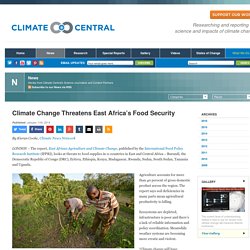
Agriculture dominates the economies of countries in East Africa: if plans aren’t made to adapt to climate change the region’s rapidly expanding population faces a grim future, says a new report. Credit: Flickr/CGIAR Climate Agriculture accounts for more than 40 percent of gross domestic product across the region.
The report says soil deficiencies in many parts mean agricultural productivity is falling. Ecosystems are depleted, infrastructure is poor and there’s a lack of reliable information and policy coordination. Bleak Prospect Crop production across the region depends overwhelmingly on rainfall. Deforestation: Facts, Causes & Effects. Deforestation is the permanent destruction of forests in order to make the land available for other uses.
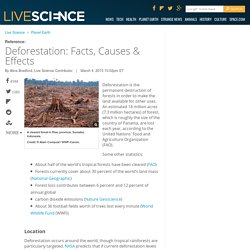
An estimated 18 million acres (7.3 million hectares) of forest, which is roughly the size of the country of Panama, are lost each year, according to the United Nations' Food and Agriculture Organization (FAO). Some other statistics: About half of the world's tropical forests have been cleared (FAO) Forests currently cover about 30 percent of the world’s land mass (National Geographic) Forest loss contributes between 6 percent and 12 percent of annual global carbon dioxide emissions (Nature Geoscience) About 36 football fields worth of trees lost every minute (World Wildlife Fund (WWF)) Deforestation occurs around the world, though tropical rainforests are particularly targeted.
NASA predicts that if current deforestation levels proceed, the world's rainforests may be completely in as little as 100 years. Error loading player: No playable sources found. Conservation. Uman activities have taken a heavy toll on our environment.
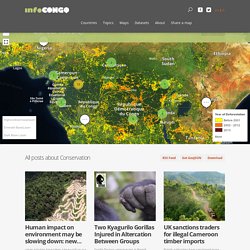
But there may be some hope, researchers say. Although human... Gorilla Doctors veterinarians in Bwindi National Park are keeping a close eye on two gorillas from the Kyaguliro group... British authorities have sanctioned more than a dozen UK importers sourcing wood from Cameroon. Illegal logging is a growing... Sactual Republic of Congo in the framework of the UNFCCC COP 21.